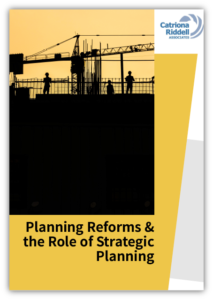
CCN Latest News, CCN News 2020 | 21 October 2020

 A new report, from Catriona Riddell Associates, comes at a time when government is proposing substantive planning reforms, including the removal of the duty to co-operate, which encourages district councils and county councils – plus neighbouring authorities – to work together on Local Plans.
A new report, from Catriona Riddell Associates, comes at a time when government is proposing substantive planning reforms, including the removal of the duty to co-operate, which encourages district councils and county councils – plus neighbouring authorities – to work together on Local Plans.
By removing this, there will be no mechanism to compel or encourage those local authorities to work together on planning and infrastructure in their areas.
Download the report here.
It argues that closer collaboration between all leading parties in setting out long-term visions for their areas would reinvigorate strategic planning across the country, moving away from ‘planning by numbers’ to encompass infrastructure, local economies, and health: crucial as areas start to devise both short-term and long-term recovery efforts in the wake of Coronavirus.
The County Councils Network (CCN), which commissioned the report, said it had long advocated for a stronger approach to strategic planning in order to achieve better place-making outcomes. It said it would consider the recommendations as part of the network’s response to the Planning for the Future White Paper and will work with its members and stakeholders to explore the merits of these proposals in further detail.
You can read CCN’s response to the white paper’s consultation here.
The report, Planning Reforms and the Role of Strategic Planning, recommends:
The report argues that this approach would enable local-decision making to be retained in the form of Local Plans, but provides the opportunity to ‘zoom out’ and asses infrastructure and economic need of a whole area, providing the impetus to unlock it by creating an all-encompassing vision for an area, with frameworks in place to ensure that the advisory bodies are not simply talking shops.
This would mean that there is less chance of Local Plans being delayed: as it would be harder to hold-up a plan that has been produced within a framework as a result of a shared vision for an area: reducing the risk of areas being at the mercy of unsuitable development.

Catriona Riddell, director of Catriona Riddell Associates, said:
“Strategic planning is about more than just sorting out housing numbers or delivering cross-boundary infrastructure. If it is do an effective job, it needs to provide a mechanism for integrating all the different components that support ‘good’ growth and a clear framework for investment in places.
“The proposals in this report would fill a large void in the current planning system and in the government’s proposed planning reforms, offering an integrated solution to supporting sustainable development across England.
“But it will only work if there is stronger collaboration between the different tiers of government, across the different functions of government and between the public and private sectors.”
 Councillor David Williams, chairman of the County Councils Network, said:
Councillor David Williams, chairman of the County Councils Network, said:
“With the government planning to scrap the duty co-operate, and Coronavirus forcing us to think about the recovery and future for our local economies, there has never been a better time to consider a reinvigorated strategic spatial planning system and this report provides much food for thought.
“We will take these recommendations on board as we respond to the government’s planning proposals but what is clear that if we want to move to an ‘infrastructure first’ approach to housing, then we need the means to bring all key local stakeholders round the table.”
You can read CCN’s response to the Planning for the Future White Paper here.
© 2024 County Councils Network | Credits | Site map | Cookies | Privacy Policy.